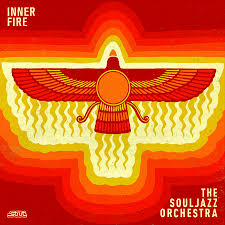Driving through Ottawa, the Canadian capital from which six-piece collective The Souljazz Orchestra hail, you may be struck by, well, nothing. It’s a famously boring city. Replete with federal buildings, anonymous office blocks and identikit universities, Ottawa is all too measured, sensible and sanitised. In one sense, then, The Souljazz Orchestra can be seen as rallying against their home town’s monotony. Drawing from a global range of influences, for twelve years they’ve been rearranging Kuti-esque Afrobeat, Ralph McDonaldian Caribbean rhythms and (unsurprisingly) a lot of soul and jazz into complex and kinetic pastiches. In another sense, however, the flaws of Souljazz’s multicultural approach to music all too present in their sixth LP Inner Fire, and are also informed by Ottawa’s grey pluralism; at its least appealing, Inner Fire is also far too measured, sensible and sanitised.
Take the penultimate song, ‘Celestial Blues’, a cover of Gary Bartz and Andy Bey’s 1971 classic. In the original, the deliberately drunken mapping of Bartz’s saxophone melody onto the unashamedly spiritual refrain, "We must get closer to the essence of life / But be aware that it takes courage and strife / Expand your mind don’t let it wither and die…" feels inspired. The tension between congregational collectivism and individual revelation is exquisitely realised, as is the inevitable failure to achieve the song’s utopian premise: the listener truly understands the title’s identification of the celestial universe and the human blues. In the Souljazz rendering, however, the song is evacuated of its spiritualism, and what we are left with is arithmetic and quantised. A sharp rimshot is delivered on time in each bar, the bass lick is solid and consistent and, as a result, the vocals feel prosaic. This all makes the saxophone solo (neatly panned to the right), the piano solo (neatly panned to the left) and the double-bass noodling at the beginning seem purely ornamental and overly symmetrical.
This very precise approach to the foundational musical matter that underlies the group’s music by no means invalidates all the tracks; the same qualities that weaken ‘Celestial Blues’ prove affecting on ‘Black Orchid’ and ‘East Flows The River’. When the former’s bassline is solidified and coupled with a Rhodes solo one minute in, it recalls the catharsis of 90s-era Tribe Called Quest instrumentals. The latter deploys the same elements, withholding its chord changes to formulaic but successfully manipulative effect.
Bridging these two tracks is ‘Agoya’, a samba-referencing, anthemic affair that hints at a wider problem with Inner Fire. The jump from genre to genre, country to country, can be tiring. Cultural exchanges have been spanning oceans and pollinating musical movements long before The Souljazz Orchestra were doing so, but such stylistic jumps within the space of a few minutes can prove somewhat disorientating. At worst, we’re left with a musical hybrid that engages with the form of everything and everywhere, but the content of nothing and nowhere. Souljazz’s cultural and musical accreditations are bonafide and clear, but the hopping between cultures leaves the album ontologically indeterminate and, therefore, lacking a sense of cultural grounding. Granted it may provoke a listener to search and discover their inspirations, the likes of Ray Barretto and Milton Nascimento, from whose palette Souljazz paint. But if that’s how we categorise the album, it becomes a mere reference point towards the work of others, a musical catalogue.
Inner Fire‘s overall rigidity is hammered home by its opening and closing tracks, ‘Initiation’ and ‘Completion’. Both are around one minute long, and bookend the album by using the same phrasing but in a different key and with different instruments. The effect is to provide Inner Fire with a neat framing device to demarcate the album’s territory. But this begs the question: how do you frame an inner fire? If, as the title suggests, Inner Fire is supposed to unleash primordial, untamed musical instincts, then its hermetically sealed form serves to undermine this idea of total freedom. In boxing up their inner fire, The Souljazz Orchestra have starved it of oxygen, so only the embers remain.


